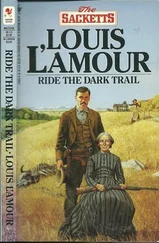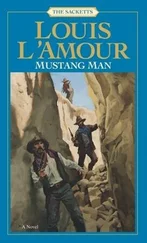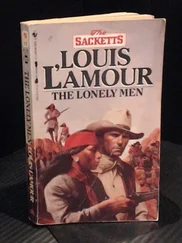The sunlight was bright on the snow-covered beauty of Mount Edgecumbe, and it shimmered over The Sisters, and to the east, over Mount Verstovia. Moving down the channel, LaBarge could see the roof of Baranof Castle, built in 1837, and the third structure on the site. The Baranov era had been a fantastic one, for the little man with the tied-on wig had ruled some of the world's toughtest men with a rod of iron, and had just barely failed to capture the Hawaiian Islands. Jean wore a smoke-gray suit with a black, Spanish-style hat. His boots were hand-cobbled from the best leather, and he looked far more the California rancher and businessman than a ship's master and fur trader. And he chose to look so.
With him in the boat were Ben Turk and Shin Boyar, aside from the boat crew. "You're to get around," he said to the Pole, "listen, and if it seems advisable, ask questions. I want to know the gossip around town, patrol ship activity, what ships have called here, conditions in town. Then return to the boat." Boyar nodded solemnly. "It is a beautiful place. I who have suffered here, I say it." He gestured toward Mount Edgecumbe. "It is as lovely as Fujiyama." A dozen loafers watched the boat come to the landing, their manner neither friendly nor hostile. Boyar disappeared into the crowd, and with Turk at his side, LaBarge started for the Castle. Leaving the old hulk that served for a landing, they walked down the dim passage through the center of the log warehouse and emerged on the street leading to the Hill. Along the way were booths where Tlingit Indians gathered to sell their wares, baskets of spruce roots, hand-carved whistles of rock crystal, beaded moccasins and a few articles of clothing. Jean stopped at one stand to buy a walrus-tusk knife for a letter opener. He would send it to Rob Walker when he had a chance: a souvenir of Sitka.
As they walked, people turned to stare. Jean's hat was unusual, and his dress elaborate for the place and time, although many illustrious visitors had come to the Castle.
On the terrace before the Castle, Jean paused to look back. The town itself was little and shabby, but the setting was superb! Tree-clad islands dotted the channels that approached the town, their fine shores rising picturesquely from the sea. All this ... and behind them Alaska, the Great Land. A stalwart Russian with close-cropped blond hair admitted them and they waited in an inner room while the servant took their names to the governor. The waiting room was, for this place at the world's end, fantastic. Here were statues and paintings worthy of the finest museum.
The Russian appeared in the door, holding it open. "If you please," he said in a husky voice, "this way."
Rudakof was a stocky, corpulent man with a round face and sideburns. He got up, thrusting out a hand, but his smile was somewhat nervous. "Captain LaBarge? I am mos' happy to see you." He paused, obviously anything but happy. "What can I do for you?"
Jean placed his papers on his desk. "I am delivering, as of this moment, a cargo of wheat, ordered for delivery here by His Excellency, Count Alexander Rotcheff, emissary of His Imperial Majesty, the Czar."
Rudakof's eyes bulged a little. The roll of titles had their effect but he was afraid of Baron Zinnovy, who had told him definitely that intercourse of any sort with foreign ships or merchants was to cease. Yet the wheat had been ordered by Count Rotcheff, and Rudakof was also afraid of him. Still, of the two he was most afraid of Zinnovy.
Jean guessed the sort of man he confronted. "There was a crop failure in Canada where wheat was previously purchased, and so the Count acted without delay." A crop failure in Canada? Rudakof had heard nothing of this, but then what did he ever hear? Nobody told him anything. If there was a crop failure it could mean serious food shortage in Sitka ... perhaps famine. He mopped his brow. "Well, uh, there has been no message, Captain, no authorization. You will have to wait until--" "I can't wait. The money is on deposit in a San Francisco bank, but if you aren't prepared to receive this cargo I'll have to dispose of it elsewhere. I imagine there are businessmen in the town who would jump at a chance to buy." Rudakofs face grew crimson. "Oh, come now!" he protested. "It is not so serious, no?" He struggled to find any excuse to delay the decision. "You will have dinner with me? There is much to do. I must think ... plan." "I'd be honored to stay for dinner. But in the meantime you will order the lighters for us?"
"Wait, wait!" Rudakof brushed a hand as if to drive away an annoying fly. "You Americans are so impetuous. The lighters are busy, and must be requisitioned.
They must--"
"Of course." LaBarge was firm. "But you are the director; the authority is yours. You can order them out."
Rudakof became stubborn. "Dinner first, then we will talk." Realizing further argument at this point would be useless, Jean shrugged. "As you like ... but we plan to be out of the harbor by tomorrow." "Tomorrow?" Rudakof was immediately suspicious. "You are in a hurry." He rustled some papers on his desk. "You talked to Count Rotcheff in San Francisco. Did you also see Baron Zinnovy?"
LaBarge frowned as if making an effort to recall. "Do you mean that peculiar young officer? The one in the pretty little white suit?" Rudakof blanched with horror at the description. "The man you speak of"--he struggled with emotion-- "is Baron Paul Zinnovy, of the Imperial Navy!" "I believe he did say something of the sort. But wasn't he the one who was in some kind of trouble in St. Petersburg? Such a young man, too!" Rudakof refused to meet his eyes. He was more worried than ever. This infernal American knew too much. He, Rudakof, had heard whispers about Zinnovy, but he did not like to think of them. Even a disgraced nobleman could have friends in high places, and if there was any shake-up here, trust the Baron to emerge on top, with those who served him.
Yet Rudakof did not wish to be held accountable for refusing a cargo of wheat that might save Sitka from famine. The colony was too dependent, and some of the citizens, like that merchant Busch, had friends who were influential also. Promising to return for dinner, LaBarge left the Castle. "Stalled," he told Turk, who had waited for him, "but I think we can get it done by tomorrow night."
"You might even have a week," Turk suggested, without much hope. "A lot could happen in Frisco."
LaBarge wasn't so sure. Without doubt Zinnovy would have left for Sitka soon after the Susquehanna cleared, and some time had been lost on the Columbia River, picking up the wheat.
Count Rotcheff might delay because he did not relish putting himself in the hands of his enemies, yet he was not a man to shirk his duty, and sooner or later they must come to Sitka.
Sending Turk to the dock with a message for Kohl, he strolled through the few streets of the town. The dark-skinned Tlingit women, picturesque in their native costumes, gathered along the street, each with some trifle to sell, and each walking with a pride of bearing that belied the menial position into which they were placed by the Russians. The Tlingits had been a warlike people, an intelligent people, physically of great strength, who were in no way awe-struck or frightened by Russian weapons. They had wiped out the first colony at Sitka in 1802, and given the right opportunity, believed they could do it again. Pausing before the clubhouse built by Etolin as a home for employees of the company, Jean watched two husky promyshleniki stagger by, drunk and hunting trouble. Shin Boyar was across the street, but he waited until the promyshleniki were gone before he crossed.
He stopped near LaBarge and without looking at him, said quietly, "You kicked up a fuss, Cap'n. Feller from the Castle hustled to the waterfront, jumped into a boat and took off for that new patrol ship, the Lena." Rudakof was acting with more intelligence than he had given him credit for possessing. He must have come upon a plan that would place him in a better bargaining position before they met at dinner.
Читать дальше












